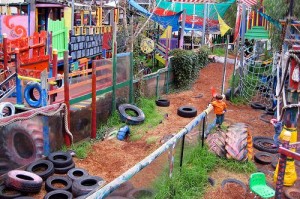There have been a rash of stories in the US media recently about playgrounds, over-protective parents, and the absence of creative play opportunities for US children. It reflects a perennial complaint about the litigious nature of US society, with stories about schools removing playground equipment because of the fear of lawsuits. A story earlier this year in The Atlantic on “The Overprotected Kid” raised a lot of interest. A recent story on NPR contrasted the presence of “adventure playgrounds” in Europe with their absence in the US, outside of a few isolated examples. These are playgrounds that are not as carefully risk-free as US playgrounds tend to be:
There are only a handful of these “wild playgrounds” in the country. They embrace the theory that free, unstructured play is vital for children and offer an antidote to the hurried lifestyles, digital distractions and overprotective parents that can leave children few opportunities to really cut loose.
The example discussed in the story is the Berkeley Adventure Playground. It doesn’t have the organized look and feel of the typical playground, but offers children the opportunity to do “dangerous play” such as hammering nails or painting. Similar is the Tinkering School outside of San Francisco, the subject of a TED talk by Gever Tulley. One of the comments posed on the NPR site about the story was something with which I – and probably a lot of baby-boomers – identify: “We had a place like this when I was a kid. We called it ‘Outside’”.
It’s not just the design and functionality of playgrounds that determines the nature of children’s play, it’s also the attitudes and behavior of the parents. In this regard, the US and the UK may be similar. A UK ex-pat mom in Germany expressed her surprise at German and Swiss parents allowing children to have pocket knives. An ex-pat US mom had a similar reaction to the unsupervised freedom allowed Dutch children.
Does it really matter that kids in the US don’t typically have the same opportunities for free-form, independent play? Or that parents are over-protective? Some would say yes, that children need the unstructured playtime to engage with other children, not with their parents or other adults. Certainly, there’s no question that freedom stimulates creativity – always being strictly under control is not ideal for the development of free, adventurous thinkers. It’s also important for social skills. According to Sergio Pellis, a researcher at the University of Lethbridge in Canada, those social skills also result in better learning in school, results that have been shown in a study measuring social skills and academic performance in third grade, then again in eighth grade. Pellis comments: “We can ask which of the two data sets, social skills or academic performance is a better predictor of their academic performance at eighth grade? And it turns out that the better predictor is social skills.” He adds: “Countries where they actually have more recess, academic performance tends to be higher than countries where recess is less.” This reflects the recognition of the importance of social learning, a central concept in learning theories and recognized increasingly as an essential component of effective online learning. Interestingly, the pedagogical approach used in mainstream MOOCs today (massive open online courses), the so-called xMOOC moves away from a emphasis on social learning, the central component of the alternative, free-form, construcivist model (the cMOOC).
